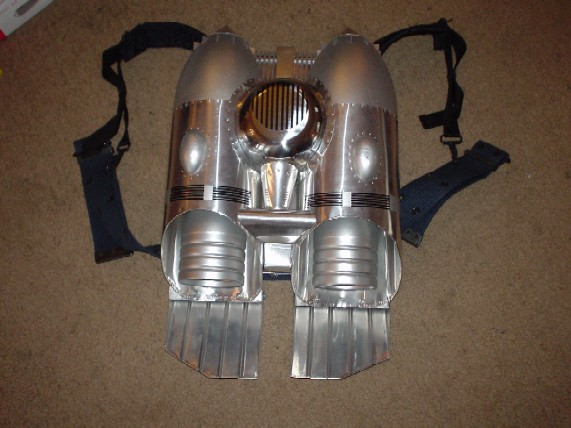
Front view, normal light. The two main
tanks are a couple of crab floats, made of high-density plastic foam,
spray-painted silver. The lower half of each float is wrapped in
sheet aluminum, which forms the curve at the bottom. You can cut
the aluminum with metal shears. The tricky part was getting all the
pieces to be the right shape. I did it by creating a life-sized
paper pattern for each piece in MacDraw (this was a few years ago
and I don't have the files any more, sorry) and making sure it worked
in paper before cutting it out of metal.
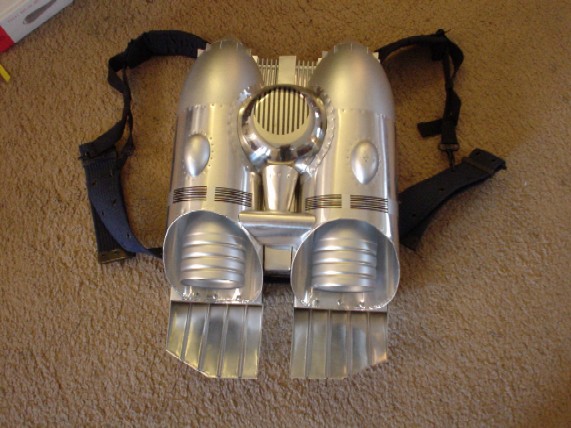
Front view, with flash. Shows some
construction details better.
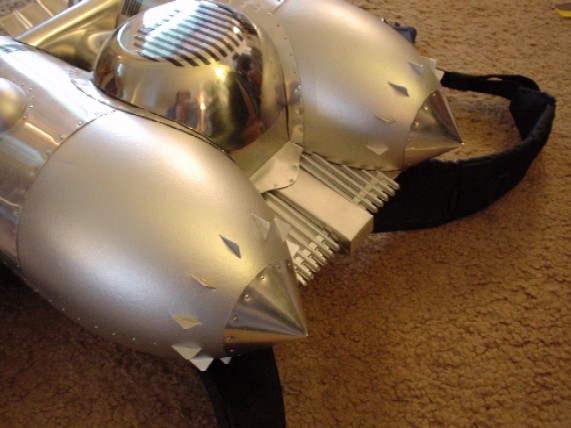
Tops of the tanks. The crab floats
have a big hole down the center so I cut a cone shape (circle
with a wedge missing) out of sheet aluminum and fastened it to
the top of each float with sewing pins. I just pushed each pin
through the metal and into the foam using a thimble on my finger.
The heads of the pins make very nice looking rivets. The little
fins are small rectangles of aluminum, bent in half and flattened to
prevent nasty cut edges from snagging people's clothing, and then
just pushed into the crab float and fastened into place with glue.
The thing that looks like a radiator grill is a bit of plastic sprue
I found I-forget-where. It's glued on top of a complex curved piece
of sheet aluminum that joins the two floats, with more sheet aluminum
(bent into the rectangular thingie) glued on top of that.
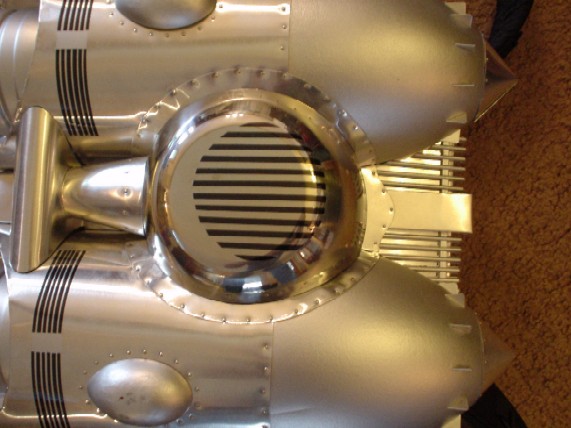
The main round thingie in the middle is
a steel mixing bowl I found in a thrift shop. Cutting it to nestle
properly against the curved surfaces all around it was a real bear.
The black "cooling vents" on the bowl and tanks are actually just
shiny black self-adhesive plastic, carefully cut and stuck to the
surface. The flange that appears to attach the round thingie to the
tanks is actually 3 separate pieces of sheet aluminum, with tabs
inside to hold the bowl in place. The flange pieces are attached
to the crab floats with sewing pins and the bowl then glued to them
with barge cement. The two egg-shaped thingies are the two halves
of a Silly Putty egg, painted silver and glued to the metal, with
more sewing pins pushed in around them.
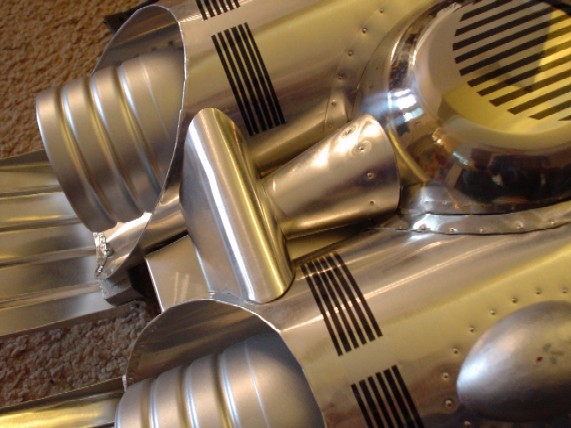
The complex curved thing in the middle
of this photo is more sheet metal. The shape would be difficult
to describe; I think I started with paper on this one, cutting and
tweaking it to shape until it had the right curve. It's a little
hard to see, but between the two sets of black "cooling vents"
is matte finish rather than shiny. This was done by masking and
spray-painting the shiny aluminum with silver spray paint.
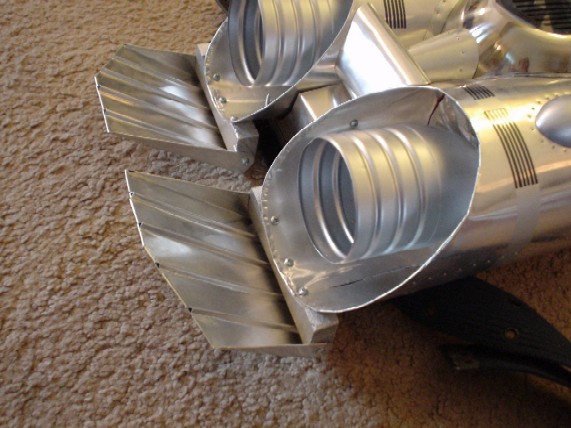
The curved bottom of each tank.
Note how the edge of the metal has been folded over and crimped to
prevent sharp edges. Much of the sheet metal is held together with
pop rivets (you can just see one above the near rocket exhaust).
The rocket exhausts are soft drink bottles with the bottom cut off,
painted silver. The "butt protector flaps" at the bottom are more
sheet metal, fastened to a piece of wood shaped like a parenthesis,
which is in turn attached to the sheet metal at the bottom of the
tank with screws. They swivel up and down, which mimics the steering
device seen (briefly) in the movie and also makes the thing a little
smaller for packing and storing.
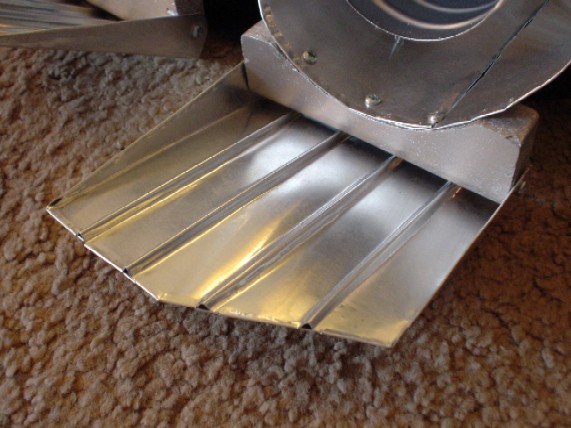
Detail of a "butt protector flap".
This is actually two pieces of sheet aluminum crimped together.
The inner one goes straight, bump, straight, bump, etc. while the
outer one is flat.
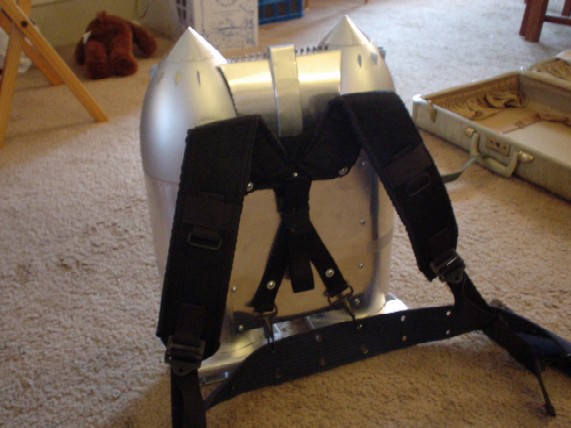
Back view. The straps and belt I found
at an army surplus store. One big piece of sheet metal, pop-riveted
to the metal that wraps each crab float, holds everything together.
This piece is folded over at the top and runs down the front, under
all the stuff you can see, to form a lightweight and rigid structure.
The backpack straps and belt are in turn pop-riveted to that piece
of metal. The straps are padded, and because the whole thing is
made of plastic foam and thin sheet aluminum with a total weight of
about 3 pounds, it's actually quite comfortable to wear.
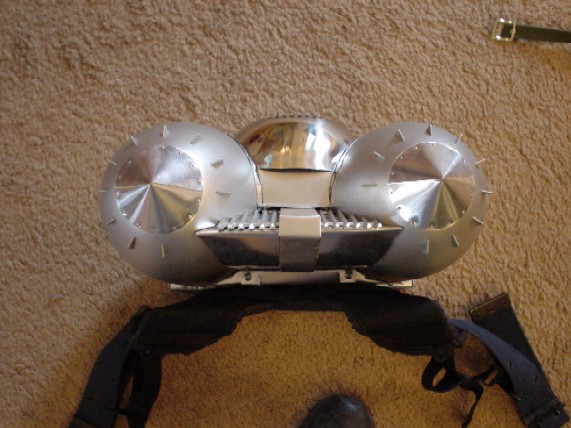
Top view.
The whole thing took me about 3 weeks of pretty intensive nights
and weekends. I spent a lot of time in surplus shops and thrift
stores looking for just the right pieces (the crab floats were the
thing that made it all come together). I bought a pop-rivet tool,
which I've never used for any other project, and went through about
five cans of silver spray paint and most of a box of straight pins.
One of the biggest problems for me was that there was very little
in the way of reference photos available (this was the year the
movie came out). I bought a couple of the official fan magazines
and freeze-framed the laser disk a lot.
I don't remember how much it all cost, but I doubt it was more than $200. The single biggest expense was the buttons on the jacket, believe it or not. Buttons are damn expensive.
As for the jacket itself: I found a women's leather jacket at a thrift store that was the right color and style and almost fit (it was too small and gapped at the front, but as long as I didn't fasten it, it was quite comfortable) and then I went to a leather store and found a leather scrap the same color. I cut the scrap into a parallelogram, hemmed the edges, and cut buttonholes around the perimeter. Then I sewed the buttons to the jacket in the right places so that the parallelogram covered the whole chest (including the gap in the front). Presto. Add leather gloves, khaki pants (should have been jodhpurs but I couldn't find any that fit and were reasonably priced), boots, and a helmet (you can probably do better than I did, the helmet was made at the last minute and I was never happy with it) and you're set.
This was a labor of love and I have not done anything nearly so elaborate since.